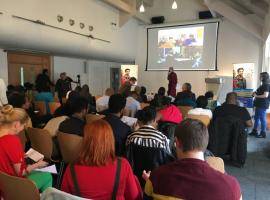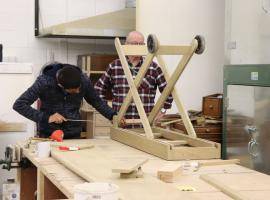Reflecting on 6 months of developing MiFriendly Cities in Coventry, Birmingham and Wolverhampton
Building the team
The project aims to establish a new regional migration initiative by not only setting out a programme of activities for migrants, but also building cohesion by showing how this benefits the wider community. To achieve this, the project has brought together organisations from across the public, private and voluntary sector to work towards this common goal. Each of these 11 partners brings different expertise and local knowledge to the table, and the project is structured in way that makes the most of their individual strengths.
This has led to a large partnership made up of over 35 posts, with more than half of those being newly created. All partners have both leading and contributing roles in several aspects of the project, so the project has needed the full team in place in order to move forward. Progress has therefore felt slow during this recruitment phase, while everyone has been eager to start delivering the programme.
Strengthening the partnership
With the majority of recruitment complete, we held a partnership away day at the City of Wolverhampton Council facilitated by MigrationWork on 1 October. The day was an opportunity for the whole team to come together and be reminded of the project’s overall objectives, how their own activities contributed to those aims, where there were opportunities for cross-fertilisation and where there were still gaps.
One common message from the day was that communication was key, both internally and externally. We must ensure that we are communicating the same key messages, are clear about our objectives, and are aware of how we communicate the project to different audiences.
This also means adapting to each other’s way of working, as every organisation varies in its day-to-day operations, and finding the right balance when communicating within a partnership of this scale. Establishing a best practice for communicating and working together effectively is something which we will continue to work on throughout the project to ensure we are reaching our full potential.
As a blueprint for other cities to become more ‘migration friendly’, this kind of reflection will be key to creating our guide to becoming a MiFriendly City. There is clearly a great level of passion within this rich partnership, and we need to make sure that we are taking advantage of it, as well as of each other’s knowledge and resources.
FabLab Pilot Course
The West Midlands Strategic Economic Plan’s principle objective is to become home to the biggest concentration of advanced manufacturing in Europe. This project will be training 300 refugees and migrants in advanced manufacturing techniques to help the region meet this vision.
A successful pilot was run back in June and at the Coventry FabLab by Coventry University , Coventry Refugee and Migrant Centre (CRMC), and Interserve. The pilot helped to identify key problems, such as the need for an additional instructor, and led the team to rethink how the employment mentoring from Interserve, which had been built into a week-long course, might function more effectively as a separate activity for participants.
Of the ten refugees and migrants who took part in the pilot – which was tied in with a 10-week programme delivered by other services in the city – three have since found employment. In total, 17 of the 300 target have been trained so far, some of those with support from previous FabLab students, which proved very successful.
Moving forward from the pilot, the project is looking at developing a structured programme which brings together many of the activities available for migrants to get involved in, offering a tailored journey through MiFriendly Cities and helping them get the maximum benefit from the initiative.
One of the projects major long-term investments is in Mobile Fablab equipment to enable the delivery of course across the region and in community spaces. However, it was identified through the pilot that it was beneficial for participants to experience the FabLab environment in Coventry, seeing the larger machinery in action and getting a sense of the industry and the potential progression towards further training. There are now plans to incorporate a visit to the Wolverhampton FabLab, which offers a more commercial view of employment opportunities in the industry, will also be added for participants learning via the Mobile FabLab in this area.
It is an exciting prospect that these FabLab courses are developing a grassroots community of ‘makers’, and we hope that could potentially tie in to Coventry City of Culture in 2021.
Author: Nicole Twamley, MiFriendly Cities Asst Communications Officer


 Integration of migrants and refugees
Integration of migrants and refugees


















